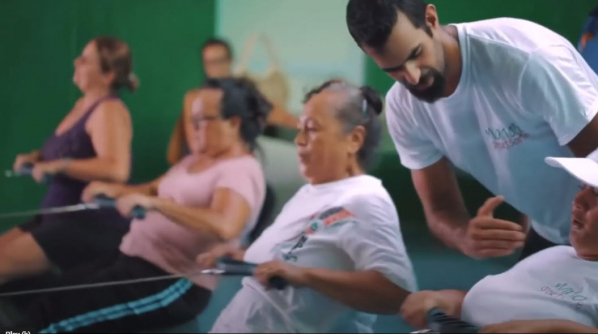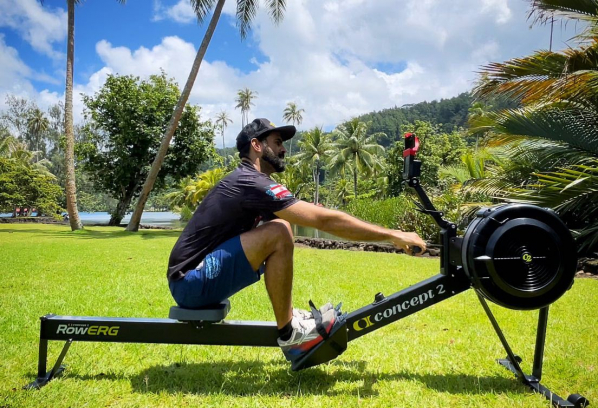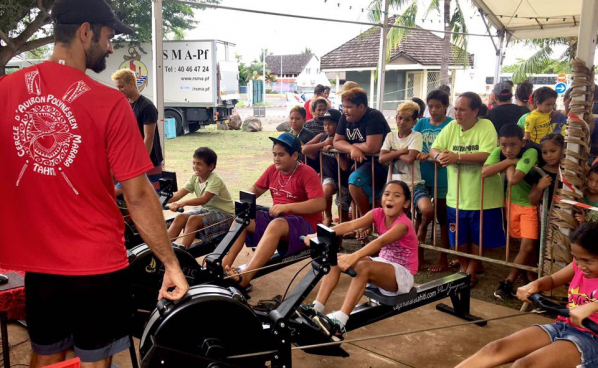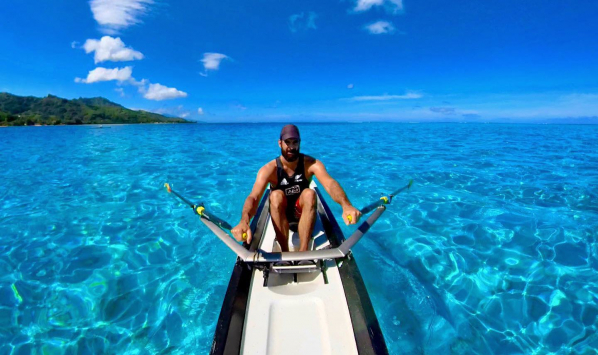Making Rowing Waves in Tahiti
 The RowErg keeps Kévin Scott busy. Very busy. He squeezes this interview around hosting an erg race that connects French Polynesia with rowing clubs in France and Oceania. The race is one of many events that Scott organizes from his home in Tahiti, all in the name of creating an ever-expanding, accessible rowing community.
The RowErg keeps Kévin Scott busy. Very busy. He squeezes this interview around hosting an erg race that connects French Polynesia with rowing clubs in France and Oceania. The race is one of many events that Scott organizes from his home in Tahiti, all in the name of creating an ever-expanding, accessible rowing community.
So how did this French native end up on a South Pacific island espousing the virtues of indoor rowing?
The rowing world didn’t always feature in Scott’s life. Scott recalls a difficult youth in France. He grew up fast, literally. “I was 14 and already over 6 feet tall.”
He was diagnosed with Scheuermann disease, which affects the vertebrae in the upper back. At the time doctors weren’t familiar with this disorder and their solution was to tell Scott to stop moving. For two years he did nothing and had what he calls a “difficult teenage time.” When he got back into sport Scott tried rowing and loved it, finding that it helped his condition. This inspired him to go to a sports university where he earned a master's degree in physical education.
Right after receiving his degree, Scott was offered a job at his rowing club, coaching competitive junior and senior squads but also teaching indoor rowing as a complimentary activity for his rowing club and for the public.

Today, his goal is to spread indoor rowing as widely as possible, making the decision not to focus on performance rowing. Scott cites his experience as a rowing coach as what moulded his approach. “As a rowing coach I focused on the most talented rowers. I also had ten guys that weren’t as good, but the boss wanted medals.” So, Scott worked with the top rowers. At the French national championships his top crew broke a rigger and didn’t make the final.
“I thought, I’ve just spent all of my time on one group of four and ignored the other ten. I decided I didn’t want to do this again. Everything exploded when that rigger broke.”
From that point, he focused on the development of rowing rather than on elite training.
His skills were noticed by the French Rowing Federation, and they asked Scott to develop programs based on his successful experiences. He assembled a team and together they developed national indoor rowing class programs, coaches' education programs, school programs, online challenges, and assisted in bringing indoor rowing to penitentiaries and fire departments.
During the time he worked for the French Rowing Federation, he got in touch with French Polynesia's indoor rowing competition organizers at the first Tahitian rowing club. The club president asked him to come to Tahiti for a two-month volunteer coaching stint. “I went for two months during my annual holidays and never left.”
That was seven years ago and since then Scott has established a flourishing Tahitian indoor rowing culture. “We have indoor rowing classes, we have machines in schools, we teach gym teachers about using the RowErg.”

A huge driver for Scott is his desire to address the obesity problem in Tahiti. The nation has one of the highest obesity and diabetes rates in the world. Scott gauges obesity as running currently around 70% for the population and up to 80% among school-aged children.
“We have a role to play here. Indoor rowing is one of the best ways to fight this,” says Scott. “When you’re overweight it’s difficult to run, but on the RowErg there are no limitations. They love it.”
Scott’s approach is also personal. “I see how rowing has changed my life both physically and socially. I want to show people how rowing can change their life. I don’t want to focus on the four top guys. If you’re interested in rowing my motto is just come and I'll be happy to help you get involved in an enriching activity."
Scott cites one story of a man over 60 who was overweight and could hardly walk up the stairs. “This year he rowed a marathon, non-stop. What an accomplishment! I prefer these moments.”
Scott wants everyone competing regardless of age or ability and says, “I don’t want them to be afraid of it. It’s about being here with friends, representing your club and being proud of what you do.”
Scott is looking to get city councils involved in creating opportunities in poorer suburbs. “One idea is that each city buys their own ergs and then shares them with schools or other facilities. I'm always trying to find new ways to include indoor rowing in with other sports. To make it happen, we have been helped by the French and Tahitian Concept2 dealers, and we are very thankful for that.”
In between his indoor rowing work Scott keeps fit by using the RowErg. He taps out 4000 km per year and occasionally gets out on the water. Scott also takes part in indoor rowing competitions “for pleasure.”

“I don’t want to do a serious program so I just decide on the day what I will do. I’m happy to compete but I’m not in the mind that I want to win and be a performer.”
He regularly brings together the largest number of entries for the World Rowing Virtual Indoor Sprints, despite coming from one of the smallest nations in the world. If there’s an indoor rowing competition don’t be surprised if Scott is involved.
